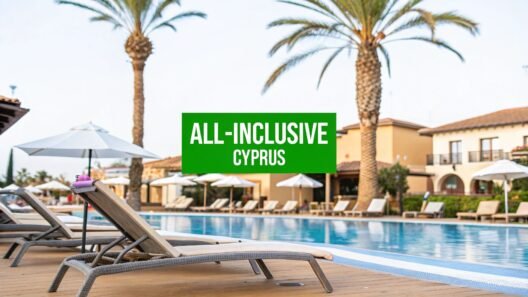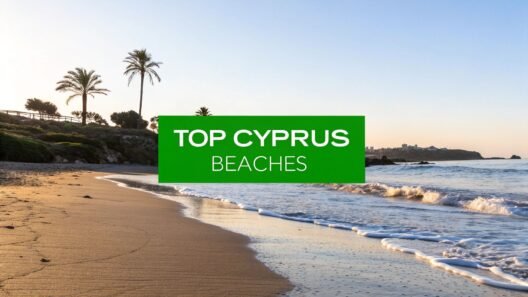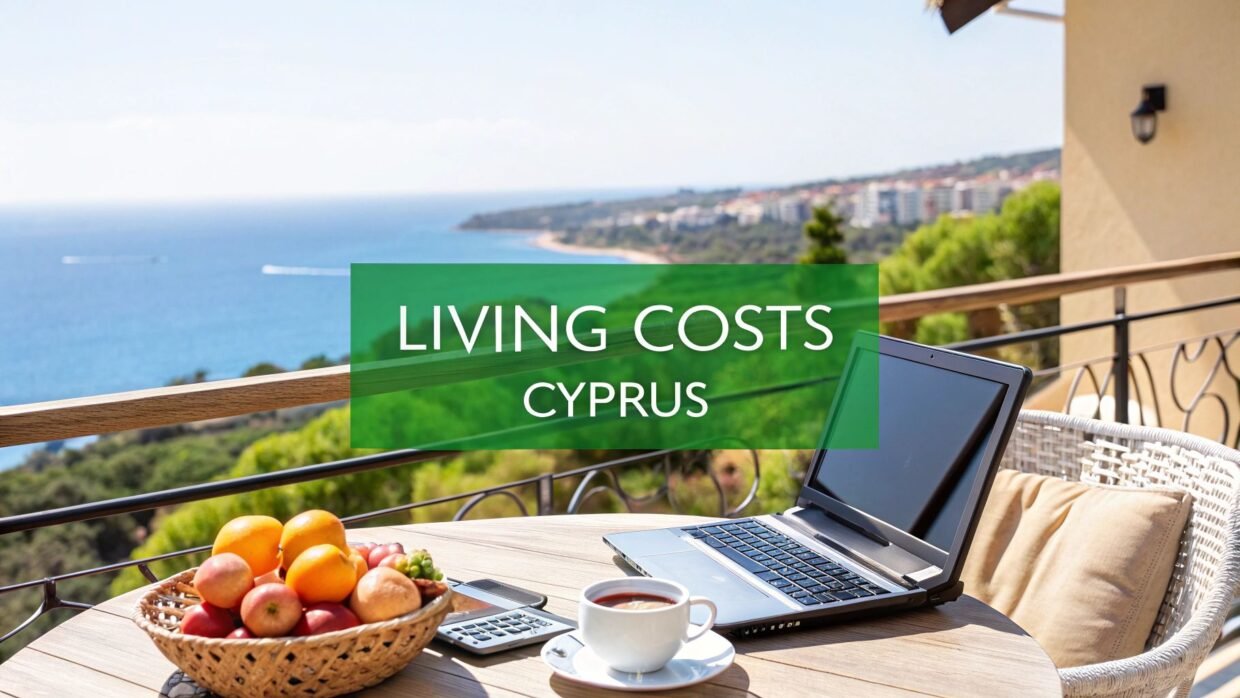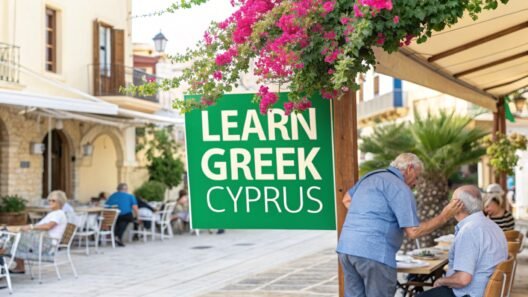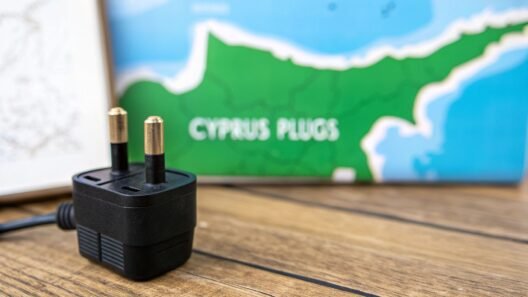So, let's get straight to the point. For many people thinking about a move, especially those coming from the UK, it all boils down to one question: is it affordable? The good news is, yes, living in Cyprus is noticeably cheaper. We're not just talking about saving a few pounds here and there; this is about a significant lifestyle shift where your money genuinely goes further, all under sunny Mediterranean skies.
Is Living in Cyprus Cheaper Than the UK?
When you stack up the cost of living in Cyprus against the UK, the island consistently offers better value. The savings aren't just limited to one or two big-ticket items, either. They ripple through almost every part of daily life, making Cyprus a really appealing option for anyone wanting a richer experience without the eye-watering prices of other popular European spots.
The biggest savings you'll notice right away are in housing and transport. But it's the combined effect of all the smaller savings that really makes a difference to your bank account at the end of the month.
- Housing: This is the big one. Whether you’re after a chic city-centre flat or a family villa in the suburbs, your rent will be substantially lower than for a similar place back in the UK.
- Transportation: Getting around costs less. Everything from filling up your car with petrol to buying a monthly bus pass is markedly more affordable.
- Daily Life: While your weekly grocery shop might feel quite similar, you'll definitely notice the lower prices when you're dining out, grabbing a coffee, or paying your utility bills.
All these financial perks mean your budget can stretch a lot further. For a more detailed breakdown, have a look at our guide on whether Cyprus is expensive in its own right.
When you crunch the numbers, the overall cost of living in Cyprus is roughly 22% cheaper than in the United Kingdom. Housing is the real game-changer, costing around 34% less than in the UK, while transport is about 39% cheaper.
To put this into perspective, we've summarised the key differences in a simple table.
Cyprus vs UK Cost of Living at a Glance
This table provides a quick look at how the main expense categories compare, showing just how significant the savings can be.
| Expense Category | Average Cost Difference (Cyprus vs UK) |
|---|---|
| Housing (Rent) | -34% |
| Transportation | -39% |
| Restaurants & Dining Out | -23% |
| Utilities (Monthly) | -18% |
| Overall Cost of Living | -22% |
These figures, based on thousands of real-world price points, really drive home the financial advantage of island life. They clearly show why Cyprus holds such strong economic appeal for so many expats looking for a better quality of life without breaking the bank.
Your Guide to Cyprus Accommodation Costs
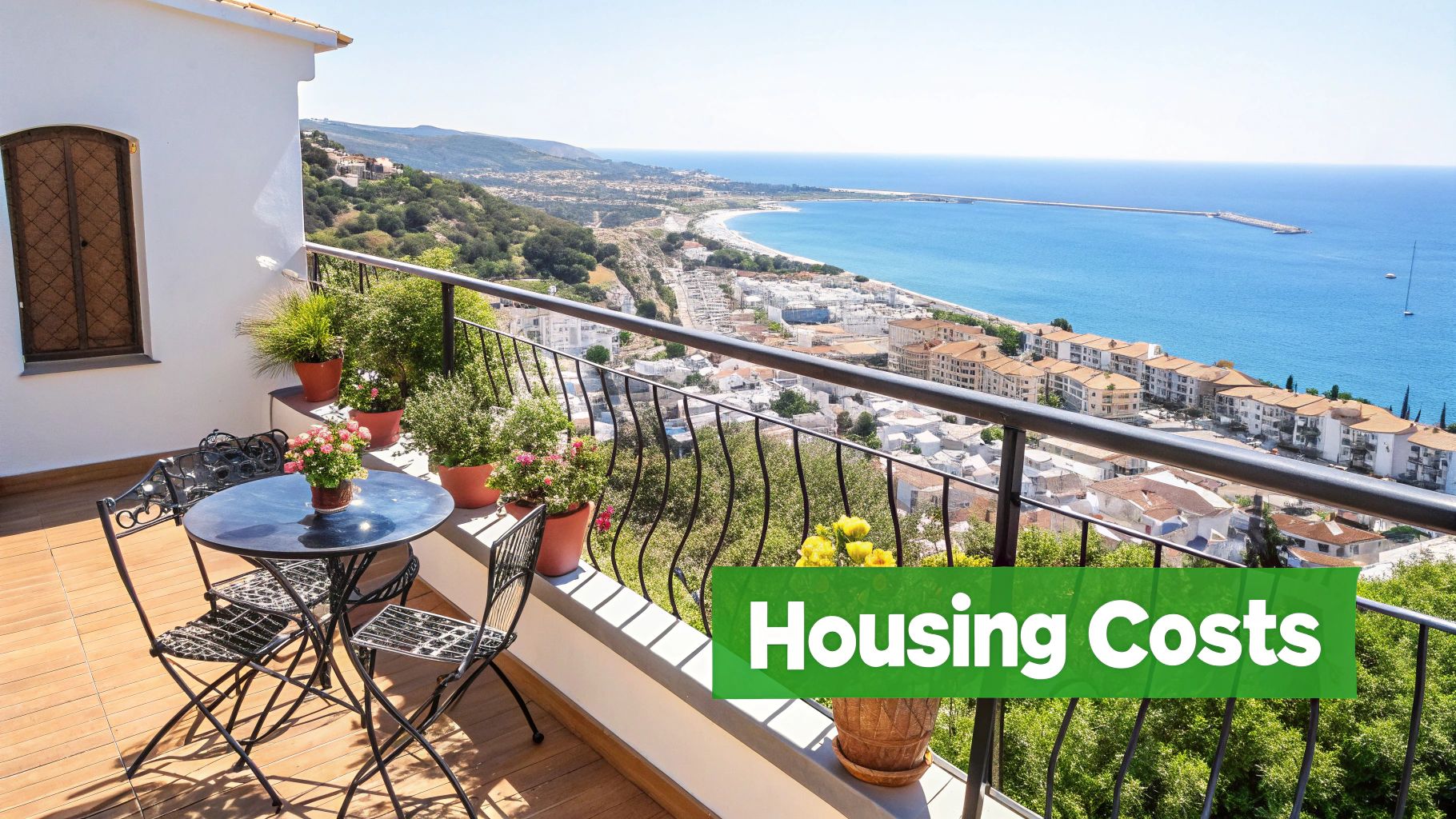
Let's talk about the biggest piece of your budget puzzle: finding a place to live. When moving to Cyprus, your rent will almost certainly be your largest monthly expense, but it’s not a one-size-fits-all figure. The cost is a real mixed bag, heavily influenced by where you want to be, the lifestyle you're after, and the type of property you choose.
Think about it this way: a sleek, modern flat in the bustling heart of Limassol is a world away from a quiet, traditional villa tucked into the hills near Paphos. As you’d expect, their price tags are dramatically different too. This variety is the key to cracking the Cypriot housing market. Your budget can stretch in surprising ways depending on what you prioritise.
Are you after the constant buzz of city life, with cafes and shops right on your doorstep? Or do you dream of the slower, sun-drenched pace of a coastal town? Each choice has its own unique flavour and, of course, its own cost.
Rental Prices in Major Cyprus Cities
Location, location, location. It’s a cliché for a reason, especially here. Your accommodation budget will be shaped more by your choice of city than anything else. Most expats flock to Nicosia, Limassol, Paphos, and Larnaca, and each one offers a completely different vibe and price point.
-
Limassol: Generally seen as the island's most cosmopolitan and expensive city. It’s a magnet for business professionals and anyone looking for a vibrant, beachfront scene. A one-bedroom flat in the city centre here will set you back €700 to €1,000 per month. A three-bedroom apartment for a family? Expect to pay anywhere from €1,300 to €1,800 or even more.
-
Nicosia: As the capital, Nicosia is the island's business and administrative hub. It’s a fantastic blend of historic charm and modern living. Rent is a bit more reasonable than in Limassol. A central one-bedroom apartment typically goes for between €600 and €850.
-
Paphos & Larnaca: These coastal cities are your best bet for affordability. They’re hugely popular with families, retirees, and anyone craving a more relaxed atmosphere. In Paphos or Larnaca, you can find a one-bedroom flat right in the centre for €500 to €750, which is excellent value.
Here’s a pro tip: moving just a little way out of the city centre can slash your rent. In pretty much every city, choosing a home in a suburb can cut your rental costs by 20-30%. That’s a hefty chunk of your monthly budget freed up for other things.
If you’re planning on securing a place before you even land, getting your head around the market specifics is a must. For a deeper dive, you might find our guide on long-term rentals in Cyprus really helpful, as it walks you through the whole process.
How Cyprus Rent Compares to the UK
For anyone moving over from the United Kingdom, the savings on rent can be genuinely eye-opening. It's one of the biggest financial perks of making the move.
On average, renting a property in Cyprus is about 17.4% lower than in the UK. But that’s just the average. The difference gets even starker when you look at specific properties. For instance, a one-bedroom apartment outside the city centre is nearly 29% cheaper in Cyprus. That’s a massive saving, month after month.
Ultimately, these lower accommodation costs play a huge role in making the overall cost of living in Cyprus so much more manageable. It means you can either save more, enjoy a higher standard of living, or find a happy medium—all while soaking up that beautiful Mediterranean sun.
Budgeting for Daily Life in Cyprus

While your rent or mortgage will be the biggest single item in your budget, it's the day-to-day costs that really shape your lifestyle. This is where you get a true feel for the cost of living in Cyprus, and honestly, it’s where the island’s affordability really begins to shine. We're talking about the things that make life enjoyable, from your weekly food shop to a spontaneous night out with friends.
Think about how you shop for food. In Cyprus, you’ve got two brilliant options. On one hand, you have the modern, well-stocked supermarkets like Alphamega and Lidl that feel familiar and have everything you need under one roof. On the other, you have the traditional farmers' markets, or ‘laiki agora’, which are an explosion of colour, noise, and incredible fresh produce.
Most people I know who've moved here quickly find a happy medium. They’ll pop into the supermarket for their pantry staples and international items but make a weekly trip to the local market for the best fruit, vegetables, fresh halloumi, and olive oil. Not only does this put money directly into the pockets of local farmers, but it also genuinely slashes your grocery bill. A bag bursting with sun-ripened tomatoes, crisp cucumbers, and local bread often costs a fraction of what you’d pay back in a UK supermarket.
Groceries and Dining Out Costs
When you start comparing your daily food spend, whether you're cooking at home or eating out, the financial advantage of Cyprus over the UK becomes crystal clear. It's a difference you'll notice straight away, and it adds up substantially over the month.
On average, groceries in Cyprus are about 12% cheaper than in the UK, and eating out at a restaurant is roughly 14% less expensive. This means your everyday essentials like milk, bread, and local cheeses are consistently more affordable, making the overall cost of living feel much more comfortable. For a deeper dive into these numbers, you can review findings on Cypriot living expenses to see the full breakdown.
For a single person, a weekly grocery budget can comfortably sit between €40-€60. A family of four will likely spend somewhere in the region of €100-€150. Of course, this really depends on your tastes and whether you stick to local produce or have a soft spot for imported brands.
The dining scene is a massive part of the culture here, and it offers fantastic value.
- Morning Coffee: Grabbing a cappuccino at a lovely seaside café will set you back about €3-€4.
- Casual Lunch: You can’t beat a delicious pork or chicken souvlaki in a warm pitta. It’s a lunchtime staple and costs just €5-€7.
- Meze Dinner: For a proper taste of Cyprus, a full meze dinner at a traditional taverna is a must. You'll get a seemingly endless parade of small dishes, and it typically costs between €20-€25 per person.
This affordability really encourages a vibrant social life, letting you enjoy the island’s incredible food without constantly checking your bank balance.
Managing Your Monthly Utility Bills
After you've sorted food, your utility bills are the next regular expense to get a handle on. This covers your electricity, water, and internet, and it’s worth remembering that these can change quite a bit depending on the season.
The biggest variable here is electricity, mainly because of the air conditioning you’ll rely on during the hot summer months from June to September. For a standard two-bedroom apartment, an average monthly electricity bill might be €80 in the winter but can climb to over €150 at the height of summer. Water bills, on the other hand, are much lower and more predictable, usually hovering around €30-€40 per month.
A reliable high-speed internet package is an absolute essential these days. You should expect to pay between €30 and €50 per month for a good home broadband connection.
Putting it all together, a rough monthly budget for utilities in an apartment looks like this:
- Electricity: €80–€150 (changes with the seasons)
- Water: €30–€40
- Internet: €30–€50
- Total Monthly Estimate: €140–€240
Once you get your head around these everyday costs, from a trip to the market to your monthly internet bill, you can build a realistic budget that lets you relax and enjoy your new life in the sun.
Understanding Transportation Costs in Cyprus
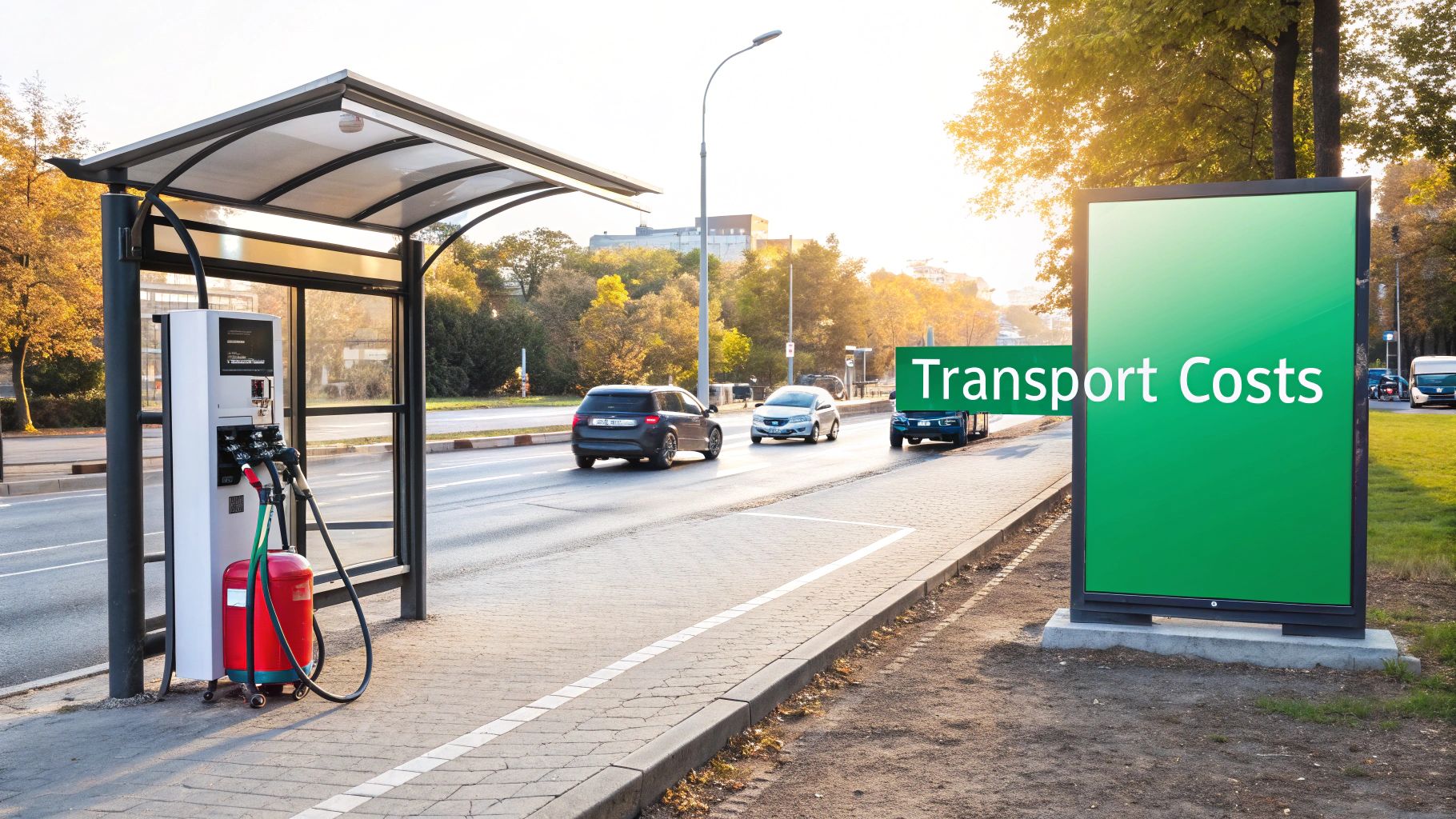
One of the greatest joys of moving to Cyprus is getting out and exploring your new island home. But how you choose to get around will play a big part in shaping your monthly budget. While the main cities have decent bus networks, let’s be honest: the real magic of Cyprus is found off the beaten path. Think hidden coves, ancient ruins tucked away in the hills, and sleepy mountain villages.
For that reason, you’ll find that most expats consider a car less of a luxury and more of a necessity. It gives you the freedom that public transport, as affordable as it is, just can’t offer. The bus system simply doesn't have the reach of a major European train or metro network. Let's break down what you can expect to spend on getting around.
The Cost of Owning a Car
If you decide that having your own set of wheels is the way to go, remember to budget for more than just the initial purchase. The day-to-day running costs are where the real expenses lie.
Petrol is obviously a big one, and you can expect prices to hover somewhere between €1.45 and €1.70 per litre. You’ll also need to get insured, which is mandatory. A standard policy for annual car insurance will typically set you back €300 to €600, depending on the car and your driving record. And don't forget routine maintenance like oil changes and new tyres, which will add up over the year.
Thinking of buying? A reliable, used economy car is a popular choice for new arrivals and can usually be found for €4,000 to €7,000. It’s a solid investment for the freedom to explore every corner of the island on your own schedule.
Navigating Public Transport
For those living right in the city centres or simply looking to keep their spending down, the public bus system is a great, budget-friendly alternative. It’s a perfectly practical way to handle your daily commute in Nicosia, Limassol, Paphos, or Larnaca.
The fares are refreshingly straightforward and affordable.
- Single Ticket: A one-way trip on a local bus will generally cost between €1.50 and €2.00.
- Monthly Pass: If you're using the bus every day, a monthly pass is a no-brainer. It costs around €40.
While the buses are fantastic for zipping around town, they aren’t always the best for travelling between cities or getting to remote spots. The journeys can be slow, and the timetables might not fit your plans, which is a key reason why so many residents ultimately choose to drive.
Taxis and Ride-Sharing Options
For those shorter trips or evenings when you'd rather leave your own car at home, taxis are everywhere. Be warned, though—they are a pricier option. A quick ride across town will likely cost you somewhere between €8 and €12, so it's probably best for occasional use rather than as your daily go-to.
The ride-sharing scene in Cyprus is still finding its feet and isn't as developed as in other parts of Europe. While a few apps are trying to make inroads, traditional licensed taxis are still the most common and reliable way to get a ride on demand.
If you're not quite ready to buy, you could always rent a car to test the waters. For new arrivals, it's a great idea to check out cheap car hire in Cyprus to get a feel for the roads before taking the plunge.
Sample Monthly Budgets for Different Lifestyles
Breaking down individual costs is useful, but the real magic happens when you see how they all slot together. It’s one thing to know the price of a loaf of bread, but another to understand what a full month of living and breathing on this island actually costs. To give you a clearer picture of the cost of living in Cyprus, I've put together a few sample budgets for different kinds of people you’re likely to meet here.
Think of these as real-world examples, not just abstract numbers. They're designed to give you a genuine feel for how your own spending might stack up, whether you're a digital nomad chasing the sun, a family putting down new roots, or a couple ready to enjoy a well-deserved retirement.
The Solo Digital Nomad
Let's start with Alex, a freelance graphic designer who's swapped a grey office view for the sun-drenched coast of Paphos. Alex's priorities are simple: fast internet for work, a good social scene, and the freedom to explore the island on weekends. This budget is all about flexibility and experience.
Here’s a rough sketch of what Alex’s monthly budget looks like:
- Rent (1-bed flat, outside the centre): €600
- Utilities (Electricity, Water, Internet): €160
- Groceries: €250
- Co-working Space Membership: €150
- Transport (Used car running costs): €200
- Health Insurance (Private): €70
- Entertainment & Dining Out: €300
- Miscellaneous (Gym, subscriptions, etc.): €120
This brings the total monthly spend to around €1,850. It's a budget that supports a comfortable, active lifestyle without being over-the-top, hitting that sweet spot between working hard and playing hard on the beautiful Cypriot coast.
The Expat Family of Four
Now, picture the Millers. They’ve moved to Limassol with their two school-age kids. For them, the checklist is completely different. They need a spacious home in a family-friendly area, a budget for international school fees, and enough left over to cover the much higher grocery bills and activity costs that come with raising a family.
Their monthly spending is naturally higher and built around these family-centric needs:
- Rent (3-bed flat, city suburb): €1,600
- Utilities (Higher usage): €250
- Groceries: €600
- Transport (Family car running costs): €300
- Education (Private school for 2 children): €1,200 (this can vary wildly)
- Healthcare (GESY/Private top-up): €150
- Entertainment & Family Activities: €400
- Miscellaneous (Clothes, kids' clubs, etc.): €300
For a family living this kind of life, the total monthly cost lands around €4,800. As you can see, education is the elephant in the room. It’s a huge chunk of the budget and proves just how vital it is for families to research school fees when working out their own cost of living in Cyprus.
This image gives you an idea of some typical leisure costs, proving that having fun in Cyprus doesn't always have to be expensive.
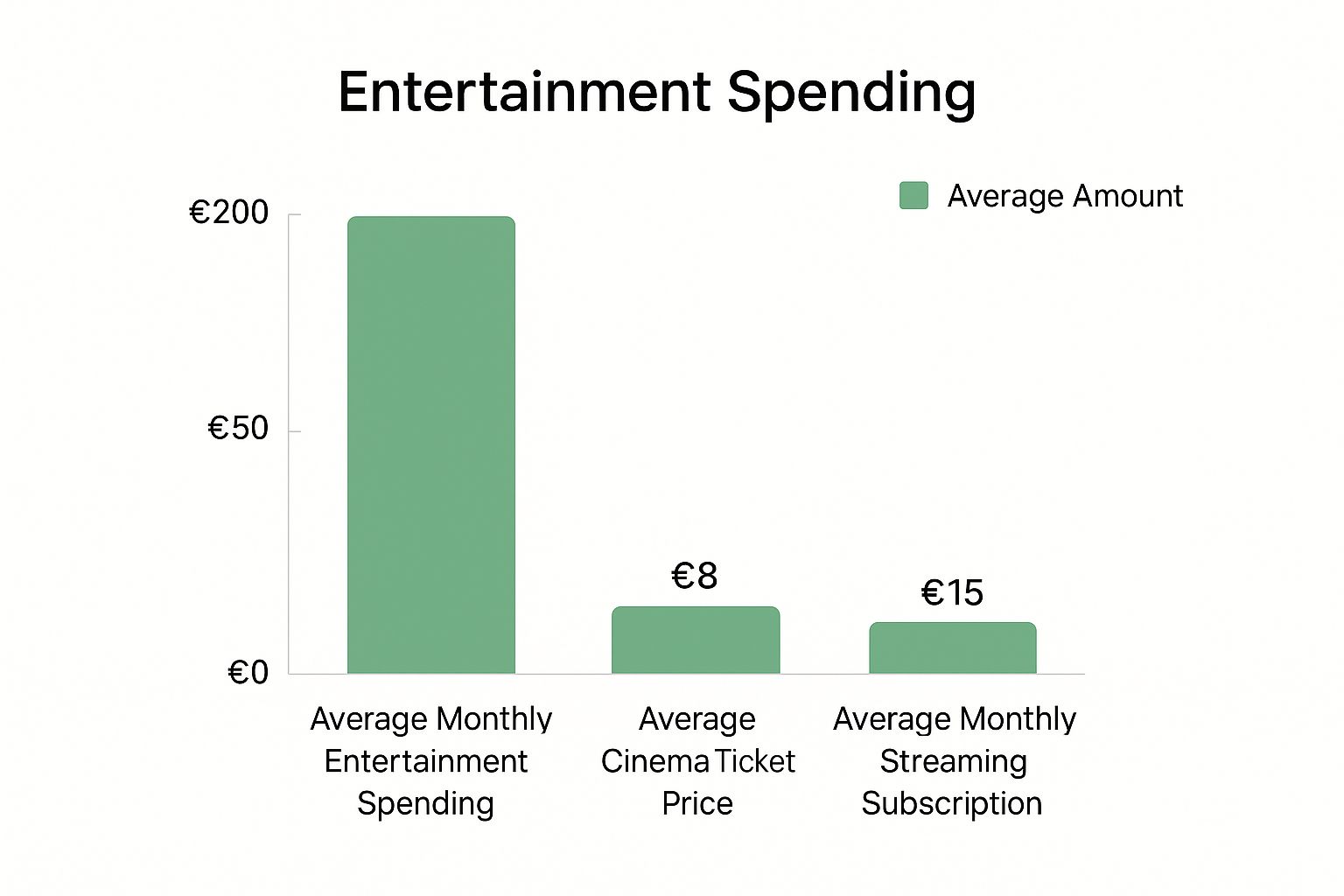
Things like a trip to the cinema or a Netflix subscription are quite affordable, which can free up more of your budget for those memorable family dinners or weekend getaways.
The Retired Couple
Finally, let's meet David and Helen, a retired couple from the UK who've found their slice of paradise in a quiet village near Larnaca. Their life is all about relaxation, comfort, good food, and having the funds to travel and welcome visiting family. They own their car outright, and their budget is geared towards a life of leisure.
Here’s what their monthly expenses could look like:
- Rent (2-bed villa with a small garden): €950
- Utilities: €200
- Groceries: €450
- Transport (Car running costs): €250
- Healthcare (Private insurance): €250
- Dining Out & Socialising: €500
- Hobbies & Travel Fund: €300
- Miscellaneous: €150
All in, a really comfortable retirement for a couple in Cyprus could be managed on roughly €3,050 per month. This isn't just about surviving; it’s about thriving. It allows for plenty of meals out, indulging in hobbies, and soaking up all the culture and natural beauty the island has to offer without worrying about every cent.
To pull all of this together, here’s a table that compares these three lifestyles side-by-side.
Sample Monthly Budgets in Cyprus (EUR)
This table offers a clear, at-a-glance comparison of the estimated monthly expenses for our three profiles. It’s a great way to visualise how different life stages and priorities translate into real-world costs.
| Expense Item | Solo Digital Nomad | Family of Four | Retiree Couple |
|---|---|---|---|
| Rent | €600 | €1,600 | €950 |
| Utilities | €160 | €250 | €200 |
| Groceries | €250 | €600 | €450 |
| Transport | €200 | €300 | €250 |
| Healthcare | €70 | €150 | €250 |
| Entertainment/Social | €300 | €400 | €500 |
| Education | N/A | €1,200 | N/A |
| Miscellaneous/Other | €270 | €300 | €450 |
| Total Estimated Monthly Cost | €1,850 | €4,800 | €3,050 |
These profiles clearly show that Cyprus can be a financially comfortable home for a wide range of people. Use them as your blueprint. Start with the one that feels closest to you, tweak the numbers to fit your own unique circumstances, and begin building a budget for your new life in the sun.
Healthcare and Schooling: Planning for Your Family's Needs
Once you’ve got a handle on your rent and grocery bills, the next big financial pieces to slot into place are healthcare and education. These aren’t just numbers on a spreadsheet; they're about your family's health and future. Cyprus has a solid setup for both, but knowing how the systems work is crucial for managing your budget and making the right choices for your life on the island.
Cyprus runs a two-track healthcare system, giving you a choice between public and private care. The public system is called the General Healthcare System, or GESY. The easiest way to think of it is as the Cypriot equivalent of the NHS in the UK, aiming to provide universal healthcare to every permanent resident. If you’re living in Cyprus legally and paying into social security, you're in.
Once you’re registered with GESY, most of your medical care is either free or requires a very small co-payment. A routine trip to your local GP, for example, will only set you back a few euros, which makes day-to-day healthcare incredibly affordable.
Why Many Expats Still Opt for Private Health Insurance
Even with the excellent public system, a lot of expats—especially those coming from the UK—decide to get private health insurance as well. What’s the appeal? It often means quicker access to specialists, a broader choice of doctors, and the assurance of treatment in private, English-speaking clinics. It's an extra layer of convenience and peace of mind.
Private cover is particularly useful for newcomers who aren't yet eligible for GESY or those who simply prefer the private experience. A basic plan for a young, healthy person might start around €30 to €60 per month, but comprehensive plans for families or retirees will naturally cost more.
A popular strategy is to mix and match. Many people use the public GESY system for regular check-ups and minor issues, but keep a private policy for emergencies or to see a specific specialist quickly. It's a smart way to balance cost with comprehensive coverage.
Budgeting for Your Children's Education
For anyone moving with kids, school fees can easily become the biggest monthly outgoing after your rent. Just like with healthcare, you have a clear choice between the public and private systems, and each has a very different impact on your finances.
Public schools in Cyprus are free for all residents, and the standard of education is generally quite high. There's one major catch, though: the language of instruction is Greek. For younger children, this can be a wonderful immersion into the local culture. For older kids arriving from an English-speaking background, however, it can be a tough academic and social challenge.
Because of the language barrier, many expat families turn to the private sector. Cyprus is home to a fantastic selection of private and international schools, most of which teach in English and follow a British or American curriculum. This provides a sense of continuity for the children and places them in a diverse, international environment.
Of course, this standard of education comes with a significant price tag. Fees vary quite a bit depending on the school's reputation and your child's age, but as a rough guide, you should expect to budget:
- Primary School: €3,000 to €7,000 per year
- Secondary School: €5,000 to €10,000+ per year
These costs are a huge part of the financial equation for families moving to Cyprus. It's an expense that demands careful budgeting, but it's an investment in a stable, high-quality education as your kids settle into their new island life.
Tying Up Loose Ends: Your Cyprus Cost of Living Questions Answered
Alright, we've crunched the numbers on rent, groceries, and getting around. But I know from experience that even with a solid plan, a few nagging questions can linger. It's those final "what ifs" that often pop up right when you think you've got everything figured out.
So, let's treat this section as our final Q&A session. We'll tackle the big questions head-on to clear up any last-minute uncertainties. Think of it as shaking out the rug one last time to find any hidden costs or concerns, ensuring your move to Cyprus is as smooth as possible.
What's a Good Salary to Live on in Cyprus?
This is the million-dollar—or rather, a few-thousand-euro—question. The honest answer? It really boils down to the life you want to live. But we can definitely set some realistic goalposts.
For a single person wanting a comfortable life—I'm talking a nice flat, a car, and enough left over to enjoy a social life without constantly checking your bank balance—you should aim for a take-home salary of around €1,800 to €2,000 a month.
Things look a bit different for a family of four, of course. With bigger accommodation needs and potential school fees, you'll need more breathing room. A comfortable standard of living, which includes factoring in private education, would call for a combined household income closer to €4,500 to €5,000 per month.
The real beauty of the cost of living in Cyprus is the incredible value you get compared to a lot of other EU spots. Limassol might be the priciest city, but in places like Paphos or Larnaca, that same salary goes a whole lot further. It’s a big reason why so many expats and families flock there.
Are There Any Hidden Costs I Should Brace For?
Yes, and it’s always better to know about them upfront! Those initial, one-off costs can catch you out if you're not prepared. For example, when you sign a lease, you're not just paying the first month's rent. You'll also need to hand over a security deposit, which is usually one or two months' worth of rent.
Here are a few other setup costs to keep on your radar:
- Temporary Digs: You'll likely need an Airbnb or a hotel for the first few weeks while you're flat-hunting.
- Kitting Out Your Home: Unless you're shipping your entire life over in a container, you'll have to budget for furniture and other household essentials.
- Official Paperwork: Don't forget the administrative fees that come with getting your residency permits sorted.
Is English Widely Spoken?
Oh, absolutely. This is one of the biggest perks of moving to Cyprus. English is spoken pretty much everywhere, especially in the main towns and tourist hubs. You won't have any trouble sorting things out in shops, restaurants, government buildings, or with doctors.
Of course, learning a few basic Greek phrases will earn you a warm smile and is a fantastic way to feel more connected to the local culture. But for getting by day-to-day? You'll be perfectly fine with English.
At SayCyprus, we're passionate about helping you discover everything this incredible island has to offer. Our in-depth guides are designed to give you the insider knowledge you need for an unforgettable experience. Explore more travel tips and destination guides on our website.





